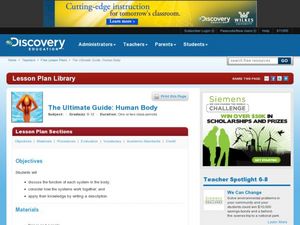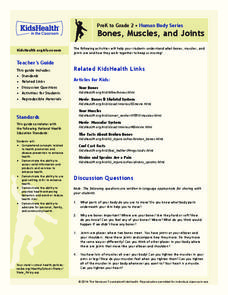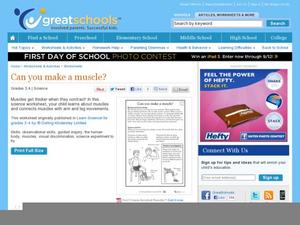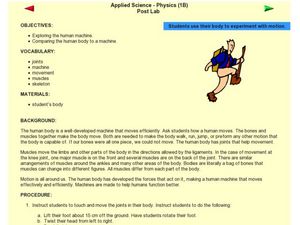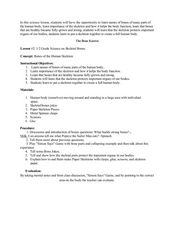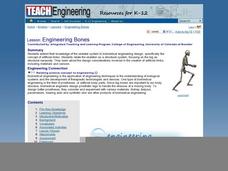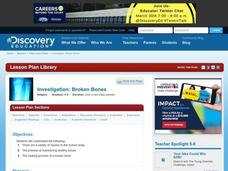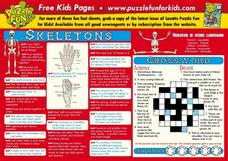Curated OER
Bones Provide Great Support!
How do bones help people move around? A science investigation prompts kids to draw arrows to certain bones that protect their organs. After they finish, they trace their hands on a piece of paper and trace the way their bones go. Great...
Curated OER
Human Body Series - Bones, Muscles, and Joints
Strengthen understanding of the musculoskeletal system with a structured lesson! Begin with a discussion of bones, joints, and muscles. Have small groups read assigned articles and watch videos to gather information and then write a...
Curated OER
The Human Body: Bones
Here is an interactive PowerPoint about the skeletal system. The first slide shows the entire skeleton and allows learners to try to name each major bone structure before clicking to show the answer. The following slides provide more...
Curated OER
Human Body Lessons
Students read "The Magic School Bus in the Human Body" and discuss the importance of maintaining a healthy body. They create a hinge and joint paper skeleton, follow the journey of a hamburger through the digestive tract, jump rope and...
Curated OER
The Human Body Lesson
Students identify features of the human body, explore needs of the human body by explaining the importance of good health in relationship to the body, and study functions and care of the human body and its organs.
Curated OER
Moving and Growing: Joints
Introduce the three types of joints found in the human body. Hinge, ball and socket, and sliding joints are discussed, examined, and defined in this short, yet informative presentation. There are a few pair-share opportunities suggested...
Curated OER
The Ultimate Guide: Human Body
Students study the body systems and their functions. In this human body lesson students research the Internet on body systems and write a description of them.
Nemours KidsHealth
Bones, Muscles, and Joints
What is the hip bone connected to? Learn about body parts and the human skeleton with a game of Simon Says, skeleton puzzle, and five question quiz.
Curated OER
Human Anatomy- How Do We Move?
Students examine the muscular system. In this muscular system lesson, students first draw a realistic representation of their leg or arm bones. Students do several activities to attach these bones to "joints" with string to simulate the...
Curated OER
Can You Make a Muscle?
Why are muscles important? Third graders study the different kinds and functions of muscles in the human body. After drawing arrows in an illustration to indicate where a muscle contraction would occur, they do their own experiment about...
Curated OER
Human Machine
Students explore the human body by conducting an exercise in class. In this human anatomy lesson, students view a diagram of the human body and identify the specific bones and joints that allow us to perform specific exercises like...
Curated OER
Life Science: Exploring Our Human Bodies
Young scholars explore the concept of the human body. They complete a variety of activities concerning the function of various organs. They listen to their heartbeat with a stethoscope, examine how muscles work during a game of tag,...
Curated OER
The Bone Known
Students explore the human skeleton. In this biology lesson, students view a diagram of the human skeleton and identify the names of bones. Students define the role bones play in protecting the human body and construct a paper skeleton...
Curated OER
Who Wants to be a Millionaire? Human Body Systems and Plants
Fifteen multiple choice questions review a variety of biology topics. In game-show fashion, viewers answer questions about a plant's needs, the skeletal system, and the cardiovascular system. If you happen to teach these three topics...
Curated OER
Joints Help Us Move
Third graders investigate the three main types of joints in their arms and legs that are in charge of movement. In this human biology lesson, 3rd graders view x-rays online to see how different joints look, participate in exercises that...
Curated OER
Engineering Bones
Middle schoolers identify the features of a prosthetic limb and explain how engineers are involved in the prosthetic design. For this bone engineering lesson students describe the design criteria that goes into choosing the materials...
Curated OER
Moving and Growing: The Human Body
In this human body worksheet, students identify the body parts on the skeleton: shoulder blade, skull, arm, backbone, wrist, hand bone, knee cap, upper leg bones, lower leg bones, and foot.
Curated OER
How 'bout them bones!
After a lesson on the human skeleton, hand out a worksheet that requires learners to identify the pelvis, rib cage, skill, spine, and thigh bones. They draw a line from the name of the bone to its location on the skeleton. Tip: Instead...
Curated OER
Dem Dry Bones Take Form
Students discover human anatomy by dancing with a song in class. In this human body lesson, students listen to the song "Dem Dry Bones" and identify the different parts of a paper human skeleton. Students perform a dance that goes...
Curated OER
Broken Bones
Middle schoolers examine a variety of injuries that can happen to the human body and discover the process of maintaining healthy bones. After discussing the process of bone repair following a break, they draw the process in cartoon...
Curated OER
Skeletons
In this science worksheet, learners investigate the human skeletal system. Students read factual paragraphs with details about the bones in the human body and in some other species as well. Learners complete a crossword puzzle.
Curated OER
Biomechanics of Sports
Learners examine the body's major organ systems and how they function and influence each other. They examine how the human body moves when involved in sports.
Curated OER
English Exercises: Mysteries of Anatomy
Consider this online interactive activity as a way to practice the names that often accompany human anatomy, such as the crown of the head and the roof of the mouth. Learners select an anatomy word with a double meaning from a drop-down...
Curated OER
Them Bones
Students learn the correct names of various bones in the human body by using locomotor skills. They, in groups, move to the "pile of bones" to get the specified piece of the skeleton and the label required and return to the group.








